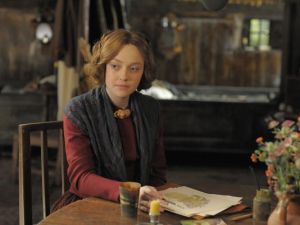 On her first night as a wife, the title character of EFFIE GRAY is disconcerted to see her husband spirited away to his bath after his long trip from Scotland by his mother. Later, at dinner, said mother all but tosses a gift to Effie telling her she might as well have it, since she will inherit it when she dies. It’s a bad start to a night that will see this innocent but intelligent girl rejected by her husband later than same night, and continually at odds with her passively aggressive gorgon of a mother-in-law. Even the assurance of a new friend, Lady Eastlake, played with panache by screenwriter Emma Thompson, that it’s perfectly reasonable to have a period of adjustment when newly married, and to have a home of one’s own with one’s husband, does little to lift Effie’s spirits, particularly when the assurances end with the unhappy thought that even if this marriage was a mistake, it’s a mistake she will just have to live with.
On her first night as a wife, the title character of EFFIE GRAY is disconcerted to see her husband spirited away to his bath after his long trip from Scotland by his mother. Later, at dinner, said mother all but tosses a gift to Effie telling her she might as well have it, since she will inherit it when she dies. It’s a bad start to a night that will see this innocent but intelligent girl rejected by her husband later than same night, and continually at odds with her passively aggressive gorgon of a mother-in-law. Even the assurance of a new friend, Lady Eastlake, played with panache by screenwriter Emma Thompson, that it’s perfectly reasonable to have a period of adjustment when newly married, and to have a home of one’s own with one’s husband, does little to lift Effie’s spirits, particularly when the assurances end with the unhappy thought that even if this marriage was a mistake, it’s a mistake she will just have to live with.
This is Victorian England, and Effie is the child-like bride of prominent art critic John Ruskin, a much older man who began courting Effie when she was twelve, but waiting until she was twenty before making her his bride. Their unpropitious start continues to deteriorate through stays in Venice, where he writes about art in monastic isolation and she discovers the decadence the city has to offer, and a disastrous trip to Scotland where Ruskin has brought the artist Edward Millais (Tom Sturridge). Trapped together in a one-room cottage, Effie’s contempt for her husband grows as her attraction to the rakish and romantic Millais grows.
Played with aetherial grace and innate wisdom by Dakota Fanning, Effie is a child-woman with a keen intelligence and nascent independence. She is more than a match for her increasingly distant husband. She is fascinating, but then, so is Greg Wise as Ruskin, in whose sad eyes and imperious demeanor one sees the loneliness of a man brought up by well-meaning but wrong-headed parents who refused to let him grow up. That he sees his wife in the abstract sense of a muse rather than a companion is as much a source of pain for him as it is for her.
This is a story told in the hushed tones of Victorian repression. There is no shouting, rather this is a a searing psychodrama of thwarted desire. The film unfolds like a perfect tone poem, seething with emotion beneath an aesthetically arranged tableau. When Effie, on her wedding night, shyly drops her nightgown in the warm reflection of firelight, the look of uncertain anticipation freezes as Ruskin appraises his bride, and walks wordlessly from the room. There are no words for Effie’s confusion, panic, and ultimate devastation, and Thompson wisely does not attempt them. The same holds true when Effie confides her perpetual virginity to the suitably shocked and empathetic Lady Eastlake, who murmurs words of consolation while her expression clearly shows that she is formulating a plan to help this child escape her fate. It is most splendidly effective, though, when Effie, on a solitary ramble during her sojourn in Scotland, spies Millais bathing in a lake. Fanning’s awakening is subtle, more in the way she cannot take her eyes off this splendid nude than in any change of expression.
By the time characters begin to speak their mind, the effect is all the more disconcerting. The veneer of propriety breeched, and the social implications for all concerned, made manifest, mixed with the relief of hearing an honest word spoken. Which is not to say that there is not an admirable finesse in the way these characters otherwise observe the proprieties of interaction while not precisely embracing them.
EFFIE GRAY is a film of observation, richly atmospheric in both the claustrophobia of a women’s place in that place and time, and the cold pale light championed by the Pre-Raphaelite art movement Ruskin championed, Millais executed, and Effie herself lived.
Your Thoughts?